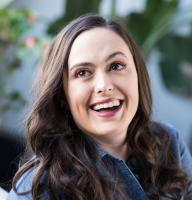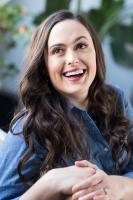Did you know that Kansas City is a hub for innovative and world-class classical composers? Laura Whitney-Johnson is one of them. Along with composer Logan Busch, Whitney-Johnson recently had new works premiered by European ensembles at the prestigious highSCORE Festival in Pavia, Italy. Inspired by music as diverse as "Middle Ages chants, Beethoven, American musical theatre, old school big band and bebop, bluegrass, and all kinds of folk music," Whitney-Johnson is a first-year Composition student at the UMKC Conservatory. Enjoy our interview below with this emerging composer.
*
Please introduce yourself. Describe your music for new listeners.
My name is Laura Whitney-Johnson, and I have lived in Kansas City, Missouri, for about three years. Before that, I lived in Lawrence, Kansas, but I was born and raised in Aurora, Nebraska. I am a composer on a never-ending quest for new sounds and colors that I can incorporate into my musical story-telling. There are things that I love in nearly every style of music throughout history, especially Middle Ages chant, Romantic and 20th-century symphonies, anything Beethoven and Bartok, American musical theatre, old school big band and bebop, bluegrass, and all kinds of folk music. I am deeply inspired by all of these, and I think they all make an appearance in my music in different ways.
You recently posted a performance of your composition “Safe Passage.” Talk about the writing process for this piece. How was this particular work challenging for you as a composer?
The big challenge of writing “Safe Passage” was the accordion part! I was accepted to the 2019 highSCORE Festival in Pavia, Italy, and they had an open call for scores for any combination of violin, cello, and accordion. Accordion is way more mainstream in Europe than it is in the United States. I had never even heard a recording of a classical accordion piece, let alone witnessed a live performance. At first, I thought that the learning curve would be too extreme, considering I only had a few weeks to write the piece. However, after hearing Sofia Gubaidulina’s De Profundis for solo accordion, I became rather obsessed and decided I had to write a trio. Through the magic of Google, I found a local accordion teacher named Julie Silfverberg. I took a lesson from her, which was mostly me asking a long list of questions about all the things the instrument can or cannot do. Julie was awesome at explaining the accordion, and our lesson/interrogation gave me lots of ideas. “Safe Passage” was selected for performance at the festival, and the trio were all members of Ensemble +47, from Oslo, Norway. It was such a great experience and I’m really glad I went for it.
How long have you been a composer? Who were some of your earliest influences?
I started playing piano when I was about 6, and I was 13 or 14 when I started composing. I mostly wrote little piano pieces that I could perform myself. I played clarinet too, but I never liked it very much because of the squeaks and the spit. When I was 16, I wrote a pop song and played and sang it at a music festival. That same year, I wrote thematic and background music for my high school’s spring play, a mystery called Simply Murder. I played piano and my fellow marching band drum major, Emily, played tenor saxophone. It was by far the most fulfilling event of my teenage years.
My earliest influence was my cousin, Adam Belvy. His piano playing made me realize I loved not only rock and pop and jazz, but also classical music. Adam also took the time to teach me everything he could about theory and harmony, and that totally changed my understanding of music. As for famous composers, no one left an impression on my early years more than George Gershwin. I heard Rhapsody in Blue and American in Paris and it sounded like it was from heaven.
I gave up on composing when I was 18 and didn’t return to it for about 6 years. In the meantime, I got a degree in Spanish and International Studies at KU. I wasn’t a great student. I was too distracted by music and would spend all my time on piano or choir instead of research. My now-husband, Tommy Johnson, is a fantastic jazz trumpet player. When we met, he helped me realize it wasn’t too late to become a composer. We decided I had to try, knowing it would take a great deal of perseverance and sacrifice. Now I’m working on my Master of Music in composition at UMKC. I want to get my doctorate next so I can be a professor. It’s still a long road ahead, but I can’t imagine doing anything else.
Describe your creative process. Where do you go to write? What tools (i.e. apps, software, etc.) do you use, if any?
I spend a lot of time imagining a piece before I write anything down, and even before I improvise at the piano. An important step for every composer is score study. My next piece will be for piano and percussion, so I’m spending hours listening to piano and percussion compositions and following along in the scores. I make weird abstract sketches for what I want the form and the feeling to be. My process is always evolving, which I think is true for most composers. When I’m ready to write, I play the piano and jot down my ideas with staff paper and pencil. Finally, I use Sibelius software to engrave my scores. I really only compose at home because I need total silence.
What music are you currently raving about?
Right now, I’m raving about Esa-Pekka Salonen’s Cello Concerto. Salonen is a famous conductor and composer from Finland. He wrote the cello concerto in 2017 and it was just recorded by the LA Philharmonic, featuring Yo-Yo Ma. It is such a colorful, inventive work, and I love how he incorporated percussion and electronic loops. Yo-Yo Ma is obviously incredible, so that doesn’t hurt. One of my new favorite composers is Anna Clyne, and I highly recommend everyone look her up on Spotify. Four of her tracks are on my “Composer Goals” playlist, and I’m really excited to hear the Kansas City Symphony perform one of her pieces in April!
Exit West by Mohsin Hamid
The Worst Hard Time: The Untold Story of Those Who Survived the Great American Dust Bowl by Timothy Egan
We Should All Be Feminists by Chimamanda Ngozi Adichie
Bossypants by Tina Fey on Audiobook CD. Tina Fey's autobiography is a funny read, but it's even better when she reads it to you on the audiobook. This will make any long drive 100 times better.
Short Term 12. This is one of the most powerful films I've ever seen, and it also demonstrates that Brie Larson is a genius actor (I also love Captain Marvel, by the way).
Sin nombre. This film is already 10 years old but is more important than ever. It is for anyone who wants a better understanding of MS-13 and the people trying to emigrate out of Central America.
Ella Fitzgerald Sings the Cole Porter Songbook
Bartok Concertos, conducted by Pierre Boulez


